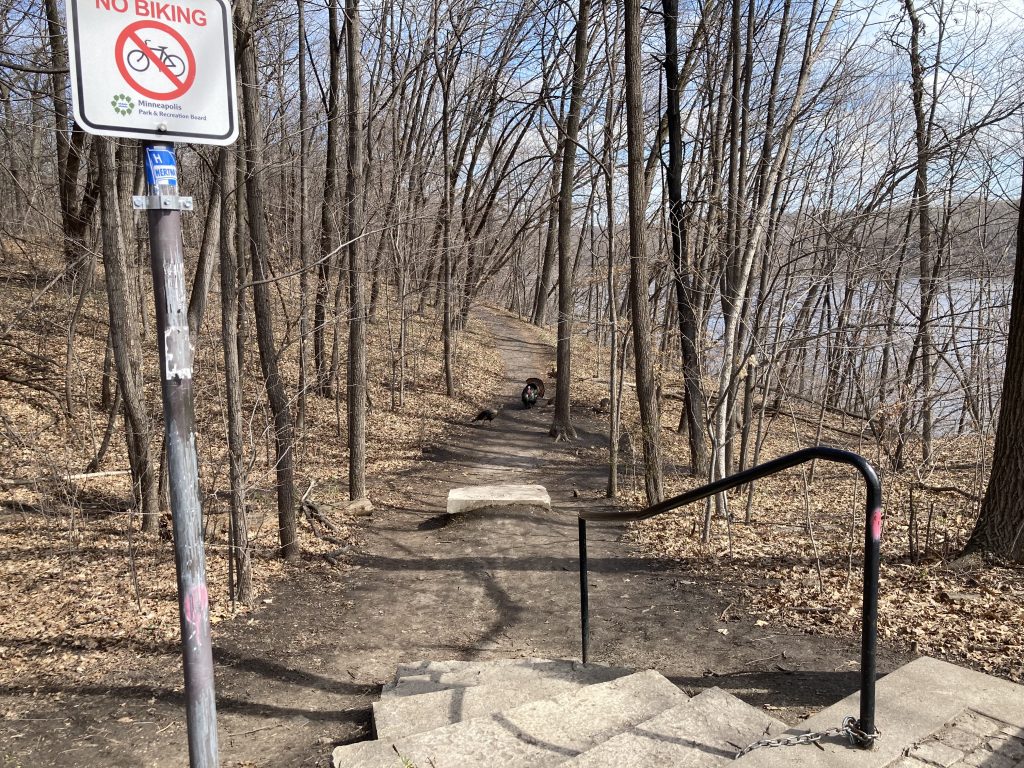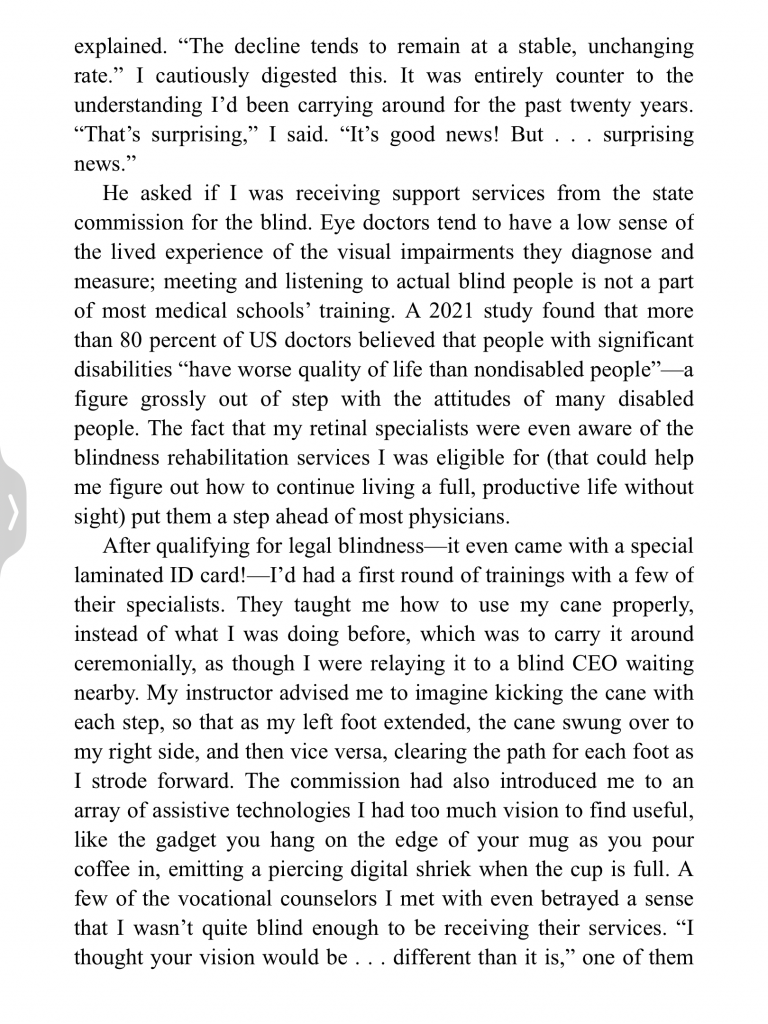3.6 miles
2 trails + tunnel of trees
35 degrees
snow flurries
Cold and windy this morning, with snow flurries. Running south at the beginning of my run, the wind was my friend, pushing me along. Running, north on the trail below, hugging the side of bluff, I hardly felt it at all. Everyday, everything is getting greener. Too soon! I heard one girl on the playground at Minnehaha Academy, laughing, some water dripping out of the sewer below 42nd, a disembodied voice down in the oak savanna. And, I heard at least 2 black-capped chickadees calling out to each other
I’ve noticed that the bird who calls out “fee Bee” first usually is more insistent, interrupting whoever is “Fee bee-ing” back to him. Today’s first caller was particularly inpatient. Is this because it’s a call of aggression, warning the other bird to stay away? Or is it because it’s an amorous male who can hardly wait to hear an answer back from a potential mate?
Anything else I remember from my run? I remember admiring the river, looking such a calm blue. I remember getting stuck behind a walker who didn’t know I was coming and having to call out “excuse me” three times–and I remember not being mad about it. I remember the extra bright yellow shirt of a runner up ahead as I started on my run, the warnings posted on poles and on signs staked near the street about the road being closed for cleaning soon, the street-cleaning truck lumbering along on the river road, blasting water near the curb, the bright orange jacket of someone climbing the old stone steps.
Today the jury begins deliberations on the Chauvin trial. I am scared, but hopeful, choosing to believe he will be found guilty. It’s a war zone here in Minneapolis, with armed National Guard members all around, and huge convoys–did I see a tank yesterday?–menacing the streets. A disgusting display of force, and a reminder of who does and does not matter.
Bobolinks!
Checking the “poem of the day” on poets.org, I found a beautiful poem about the Bobolink. When I read the line, “a black and white bird,” I remembered on April 5th (which I posted at the end of my April 6th entry), I mentioned a bird that sounded a little like a robin but was black and white. I couldn’t figure out what it was. Could it have been a bobolink? I’ve decided to believe that it was.
On March 23rd, I wrote about bobolinks when they were mentioned in the Emily Dickinson poem I was reading, Some keep the Sabbath going to Church – (236):
Some keep the Sabbath going to Church –
I keep it, staying at Home –
With a Bobolink for a Chorister –
And an Orchard, for a Dome –
I was reminded of the bobolink (BOB a link) when I read “Flare” in MO’s The Leaf and the Cloud:
2.
You still recall, sometimes, the old barn on your great-grandfather’s
farm, a place you visited once, and went into, all alone, while the grownups
sat and talked in the house.
…..
You could have stayed there forever, a small child in a corner, on the
last raft of hay, dazzled by so much space that seemed empty, but wasn’t.
Then—you still remember—you felt the rap of hunger—it was noon—
and you turned from that twilight dream and hurried back to the house,
where the table was set, where an uncle patted you on the shoulder for
welcome, and there was your place at the table.
11.
Anyway,
there was no barn.
No child in the barn.
No uncle no table no kitchen.
Only a long lovely field full of bobolinks.
Both ED and MO see the sacred in birds like the bobolink, and in nature. ED continues her poem with 2 more stanzas:
Some keep the Sabbath in Surplice –
I, just wear my Wings –
And instead of tolling the Bell, for Church,
Our little Sexton – sings.
God preaches, a noted Clergyman –
And the sermon is never long,
So instead of getting to Heaven, at last –
I’m going, all along.
And, here is a bit from The Leaf and the Cloud that echoes that idea:
from “Work”
2.
The dreamy heads of the grass in early summer.
In midsummer: thick and heavy.
Sparrows swing on them, they bend down.
When the sparrow sings, its whole body trembles.
Later, the pollen shakes free.
Races this way and that way,
like a mist full of life, which it is.
We stand at the edge of the field, sneezing.
We praise God, or Nature, according to our determinations.
Here’s the poem that inspired these continued reflections on the bobolink:
In a meadow
as wide as a wound
I thought to stop
and study the lesser stitchwort’s
white flowers lacing up
boot-level grasses
when I was scolded in song
by a black and white bird
whose wings sipped air,
swallow-like, until he landed
on the highest tip
of yellow dock,
still singing his beautiful warning,
the brown female
with him in fear.
The warning was real:
the anniversary of my husband’s suicide.
What was the matter with life? Sometimes
when wind blows,
the meadow moves like an ocean,
and on that day,
I was in its wake—
I mean the day in the meadow.
I mean the day he died.
This is not another suicide poem.
This is a poem about a bird
I wanted to know and so
I spent that evening looking
up his feathers and flight,
spent most of the night
searching for mating habits
and how to describe the yellow
nape of his neck like a bit
of gothic stained glass,
or the warm brown
females with a dark eyeline.
How could I have known
like so many species
they too are endangered?
God must be exhausted:
those who chose life;
those who chose death.
That day I braided a few
strips of timothy hay
as I waited for the pair
to move again, to lift
from the field and what,
live? The dead can take
a brother, a sister; not really.
The dead have no one.
Here in this field
I worried the mowers
like giant gorging mouths
would soon begin again
and everything would be
as it will.
My favorite part of this poem today are the lines:
This is not another suicide poem.
This is a poem about a bird
I wanted to know and so
I spent that evening looking
up his feathers and flight,
spent most of the night
searching for mating habits
and how to describe the yellow
nape of his neck like a bit
of gothic stained glass,
I like the way those first two lines ease me back from the shock of the previous lines about her late husband’s suicide with the comforting claim that this poem is about the bird, not suicide, and the pleasing, gentle rhymes of know/so and flight/night, and the beautiful image of the “nape of his neck like a bit/of gothic stained glass.”
Some bobolink sources:
God must be exhausted
At the risk of making this entry too long and too packed with poems, I’m adding three more, prompted by death, and God’s exhaustion, and the choosing of life or death (or, maybe, like MO, both life and death?), and the recent discovery that cancer has most likely returned for a loved one.
one: Radiation Prayer/ Katie Farris
I love the poetry of Katie Farris–a favorite, “What Would Root”–and I have, with sadness, followed her year+ battle with breast cancer on twitter. Every few months, she posts a new, beautiful poem about her treatment. Today’s involved a gut-wrenching decision:
I find in the mirror a woman–breastless, burned–who
in an advisory capacity,
asks, “How much do you
want to live?”
Enough.
Oh–that enough, which I initially read as enough to choose the damage to prevent the chance of more cancer, but now realize it could also be a command: Enough. Too much. Stop. I can’t take anymore.
Mary Oliver was diagnosed with lung cancer in 2012. She wrote about it in Blue Horses:
1.
Why should I have been surprised?
Hunters walk the forest
without a sound.
The hunter, strapped to his rifle,
the fox on his feet of silk,
the serpent on his empire of muscles—
all move in a stillness,
hungry, careful, intent.
Just as the cancer
entered the forest of my body,
without a sound.
2.
The question is,
what will it be like
after the last day?
Will I float
into the sky
or will I fray
within the earth or a river—
remembering nothing?
How desperate I would be
if I couldn’t remember
the sun rising, if I couldn’t
remember trees, rivers; if I couldn’t
even remember, beloved,
your beloved name.
3.
I know, you never intended to be in this world.
But you’re in it all the same.
so why not get started immediately.
I mean, belonging to it.
There is so much to admire, to weep over.
And to write music or poems about.
Bless the feet that take you to and fro.
Bless the eyes and the listening ears.
Bless the tongue, the marvel of taste.
Bless touching.
You could live a hundred years, it’s happened.
Or not.
I am speaking from the fortunate platform
of many years,
none of which, I think, I ever wasted.
Do you need a prod?
Do you need a little darkness to get you going?
Let me be urgent as a knife, then,
and remind you of Keats,
so single of purpose and thinking, for a while,
he had a lifetime.
4.
Late yesterday afternoon, in the heat,
all the fragile blue flowers in bloom
in the shrubs in the yard next door had
tumbled from the shrubs and lay
wrinkled and fading in the grass. But
this morning the shrubs were full of
the blue flowers again. There wasn’t
a single one on the grass. How, I
wondered, did they roll back up to
the branches, that fiercely wanting,
as we all do, just a little more of
life?
The fierce wanting, the life not wasted, the darkness that gets you going, cancer’s hungry, careful intent.
It’s the best part of the day, morning light sliding
down rooftops, treetops, the birds pulling themselves
up out of whatever stupor darkened their wings,
night still in their throats.
I never wanted to die. Even when those I loved
died around me, away from me, beyond me.
My life was never in question, if for no other reason
than I wanted to wake up and see what happened next.
And I continue to want to open like that, like the flowers
who lift their heavy heads as the hills outside the window
flare gold for a moment before they turn
on their sides and bare their creased backs.
Even the cut flowers in a jar of water lift
their soon to be dead heads and open
their eyes, even they want a few more sips,
to dwell here, in paradise, a few days longer.
I love a lot about this poem, especially her praising of openness, and her idea of paradise as on earth (paradise as Nature, like ED and MO?).

